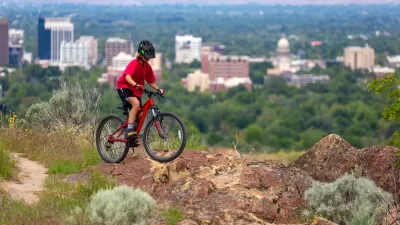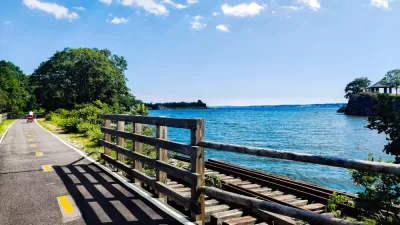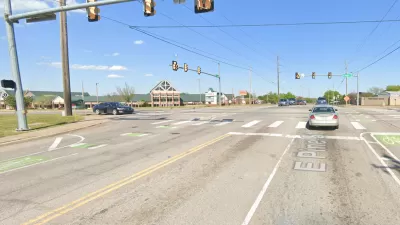Public outcry about the priority given protected bike lanes on streets can be mitigated when civic crowdfunding is part of the planning process, according to this article.

Kate Gasparro writes of the potential for civic crowdfunding to mitigate the "bikelash" that has created controversy when new protected bike lane infrastructure is installed in cities around the country, even leading to the removal of newly installed bike infrastructure in some locations.
"I’ve found that many places that have avoided bikelash as they roll out new protected bike lanes have something in common: a creative approach to cultivating public support" (i.e., crowdfunding), writes Gasparro. "Instead of encouraging residents to attend public meetings, city officials and local civic groups are meeting community members where they live and work."
Gasparro is a graduate research fellow at Stanford University, and these conclusions grow out of research into community engagement that created an "accidental" expertise in bike lanes. Here, Gasparro explains that history and the conclusion offered in this article in more detail:
During a four-year study of civic crowdfunding, I found that this collective fundraising technique has been used to support projects like protected bike lanes in non-monetary ways, such as building consensus. This is often a primary motivation for starting the campaign. The buy-in that crowdfunding brings about often proves far more valuable than any help paying the tab.
This happens because community organizations engage community members around the project. They convene discussions about the project in public spaces and at local businesses. During these events, nearby residents become acquainted with the proposed plans and voice their concerns before it’s too late to change course.
FULL STORY: Civic crowdfunding reduces the risk of ‘bikelash’

Alabama: Trump Terminates Settlements for Black Communities Harmed By Raw Sewage
Trump deemed the landmark civil rights agreement “illegal DEI and environmental justice policy.”

Study: Maui’s Plan to Convert Vacation Rentals to Long-Term Housing Could Cause Nearly $1 Billion Economic Loss
The plan would reduce visitor accommodation by 25% resulting in 1,900 jobs lost.

Planetizen Federal Action Tracker
A weekly monitor of how Trump’s orders and actions are impacting planners and planning in America.

Study Links Covid and Poor Driving
The effects of the virus, including ‘brain fog,’ can make driving more difficult and dangerous.

Waymo Gets Permission to Map SF’s Market Street
If allowed to operate on the traffic-restricted street, Waymo’s autonomous taxis would have a leg up over ride-hailing competitors — and counter the city’s efforts to grow bike and pedestrian on the thoroughfare.

Parklet Symposium Highlights the Success of Shared Spaces
Parklets got a boost during the Covid-19 pandemic, when the concept was translated to outdoor dining programs that offered restaurants a lifeline during the shutdown.
Urban Design for Planners 1: Software Tools
This six-course series explores essential urban design concepts using open source software and equips planners with the tools they need to participate fully in the urban design process.
Planning for Universal Design
Learn the tools for implementing Universal Design in planning regulations.
Caltrans
Smith Gee Studio
Institute for Housing and Urban Development Studies (IHS)
City of Grandview
Harvard GSD Executive Education
Toledo-Lucas County Plan Commissions
Salt Lake City
NYU Wagner Graduate School of Public Service





























